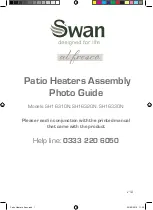
www.desatech.com
121353-01F
22
Figure 28 - Correct Pilot Flame Pattern
(Propane/LP Pilot Shown)
Pilot Burner
Thermocouple
Pilot Burner
Thermocouple
Figure 29 - Incorrect Pilot Flame Pattern
(Propane/LP Pilot Shown)
BURNER PRIMARY AIR HOLES
Air is drawn into the burner through the holes
in the fitting at the burner entrance. These
holes may become blocked with dust or lint.
Periodically inspect these holes for any block-
age and clean if needed. Blocked air holes
will create soot.
MAIN BURNER
Periodically inspect all burner flame holes with
the heater running. All slotted burner flame
holes should be open with yellow flame pres
-
ent. All round burner flame holes should be
open with a small blue flame present. Some
burner flame holes may become blocked by de
-
bris or rust, with no flame present. If so, turn off
heater and let cool. Remove blockage, blocked
burner flame holes will create soot.
BURNER FLAME PATTERN
Figure 30 shows a correct burner flame pat
-
tern. Figure 31 shows an incorrect burner
flame pattern.
If burner flame pattern is incorrect as shown
in Figure 31
• turn heater off (see
To Turn Off Gas to Ap-
pliance
, page 20)
• see
Troubleshooting
, page 24
Figure 30 - Correct Flame Pattern
Figure 31 - Incorrect Flame Pattern
INSPECTING bURNERS
Check pilot flame pattern and burner flame
patterns often.
pILOT FLAME pATTERN
Figure 28 shows a correct pilot flame pattern.
Figure 29 shows an incorrect pilot flame pat
-
tern. The incorrect pilot flame is not touching
the thermocouple. When the thermocouple
cools, the heater will shut down.
If pilot flame pattern is incorrect, as shown
in Figure 29
• turn heater off (see
To Turn Off Gas to Ap-
pliance
, page 20)
• see
Troubleshooting
, page 24
Note: The pilot flame on natural gas units will
have a slight curve, but flame should be blue
and have no yellow or orange color.











































